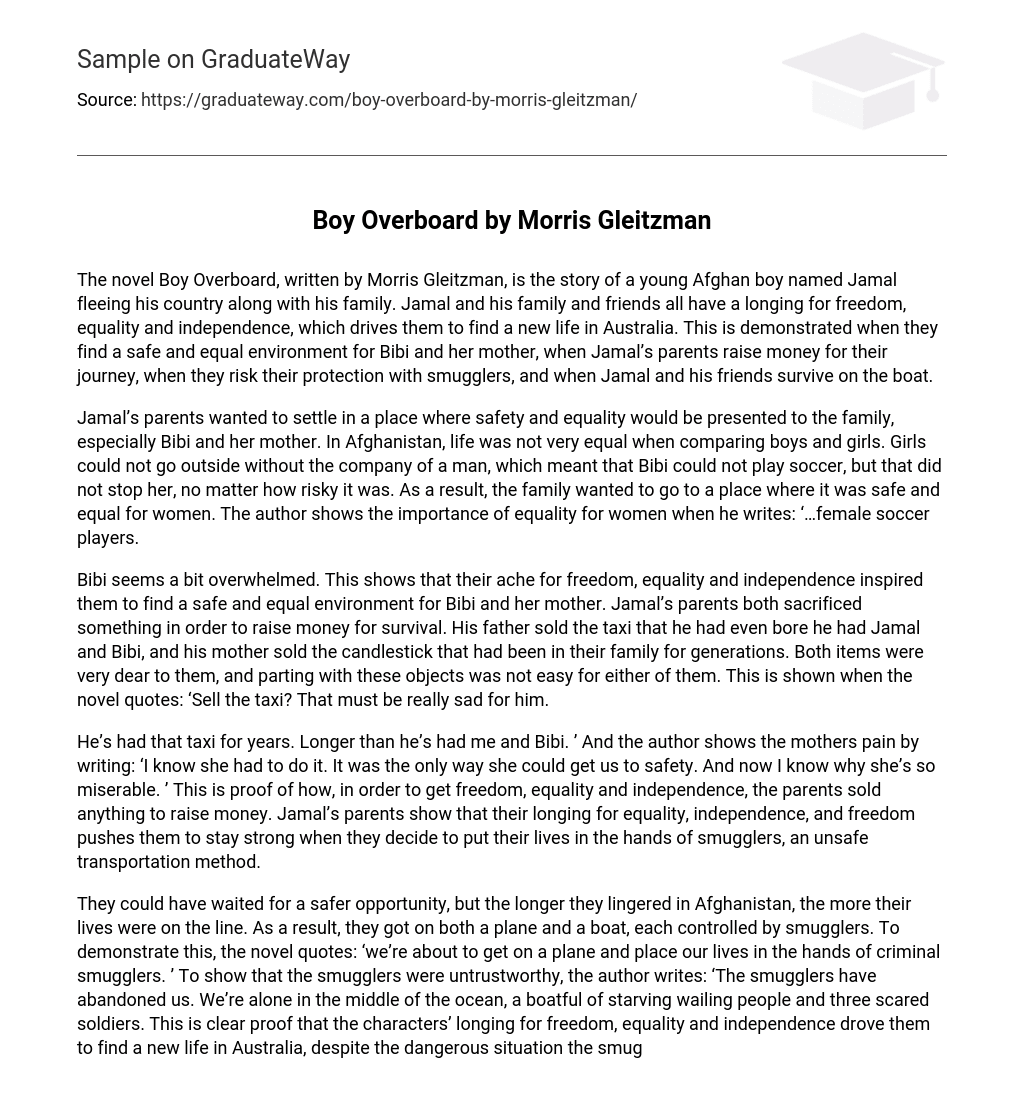The novel Boy Overboard, written by Morris Gleitzman, is the story of a young Afghan boy named Jamal fleeing his country along with his family. Jamal and his family and friends all have a longing for freedom, equality and independence, which drives them to find a new life in Australia. This is demonstrated when they find a safe and equal environment for Bibi and her mother, when Jamal’s parents raise money for their journey, when they risk their protection with smugglers, and when Jamal and his friends survive on the boat.
Jamal’s parents wanted to settle in a place where safety and equality would be presented to the family, especially Bibi and her mother. In Afghanistan, life was not very equal when comparing boys and girls. Girls could not go outside without the company of a man, which meant that Bibi could not play soccer, but that did not stop her, no matter how risky it was. As a result, the family wanted to go to a place where it was safe and equal for women. The author shows the importance of equality for women when he writes: ‘…female soccer players.
Bibi seems a bit overwhelmed. This shows that their ache for freedom, equality and independence inspired them to find a safe and equal environment for Bibi and her mother. Jamal’s parents both sacrificed something in order to raise money for survival. His father sold the taxi that he had even bore he had Jamal and Bibi, and his mother sold the candlestick that had been in their family for generations. Both items were very dear to them, and parting with these objects was not easy for either of them. This is shown when the novel quotes: ‘Sell the taxi? That must be really sad for him.
He’s had that taxi for years. Longer than he’s had me and Bibi. ’ And the author shows the mothers pain by writing: ‘I know she had to do it. It was the only way she could get us to safety. And now I know why she’s so miserable. ’ This is proof of how, in order to get freedom, equality and independence, the parents sold anything to raise money. Jamal’s parents show that their longing for equality, independence, and freedom pushes them to stay strong when they decide to put their lives in the hands of smugglers, an unsafe transportation method.
They could have waited for a safer opportunity, but the longer they lingered in Afghanistan, the more their lives were on the line. As a result, they got on both a plane and a boat, each controlled by smugglers. To demonstrate this, the novel quotes: ‘we’re about to get on a plane and place our lives in the hands of criminal smugglers. ’ To show that the smugglers were untrustworthy, the author writes: ‘The smugglers have abandoned us. We’re alone in the middle of the ocean, a boatful of starving wailing people and three scared soldiers. This is clear proof that the characters’ longing for freedom, equality and independence drove them to find a new life in Australia, despite the dangerous situation the smugglers had put them in. Jamal and his friends show a great amount of bravery and tactical thinking on the smugglers boat – all because of their longing for freedom, equality and independence. Jamal and Bibi had to use a lot of initiative on the boat, as their parents were on another boat.
Together with Rashida and Omar, they protect each other, sacrificing anything that needed to be sacrificed for the safety of themselves and each other. The smugglers aren’t trustworthy, which is proved when they ask for even more money in order to continue their journey on the boat. The author shows they’re willing to sacrifice by writing: ‘Rashida reaches into her suitcase and hands something to the chief smuggler. It’s a watch. “Four people” she says … “Where did you get something that valuable? He asks Rashida. “Dad bought it with the rest of his savings” she replies. “He knew this would happen”’. The boat had also started leaking and Jamal and Bibi kept on trying to scoop water out of the boat – despite how cold and numb they were. To prove this, the novel quotes: ‘Poor Bibi. We’re numb and cold. And dizzy with exhaustion and hunger … I keep scooping. ’ This demonstrates that the characters’ longing for freedom, equality and independence drove them to find a better life in Australia.
In the novel Boy Overboard, written by Morris Gleitzman, Jamal and his family and friends all had a longing for freedom, equality and independence, which drives them to find a new life in Australia. This is shown when Jamal’s father sells the taxi, when his mother sells the candlestick, when they risk their protection with smugglers, and when Jamal and his friends survive on the boat. The characters did yearn for freedom, equality and independence and this encouraged them to strive for their goal: to reach Australia and live a better life.





